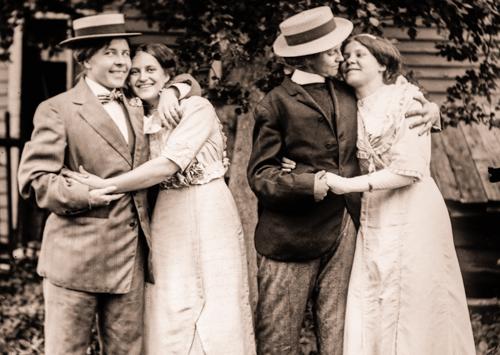Blog
The Microphone in the Closet: Studs and LGBTQ Voices

When Studs Terkel was born in New York City in 1912, private gatherings of LGBTQ individuals were subject to police harassment, consensual sexual activity between same-sex individuals was a felony in every state, and to live an open life as a member of the LGBTQ community was to risk social ostracism, criminal prosecution, state-sanctioned torture in a psychiatric institution, or worse. By the time of his death in 2008, anti-sodomy laws had been struck down by the Supreme Court, several members of Congress were openly gay, and LGBTQ stories abounded in our popular culture, from Angels in America and The Laramie Project to Will & Grace and Boys Don't Cry. And Studs, with his trademark white mane, melodically rakish voice, and boundless curiosity, was there for everything in between; from Stonewall and gay liberation, to AIDS, the culture wars, and Don't Ask Don't Tell.
At a time when LGBTQ life was essentially criminalized, Studs used his microphone to help shatter The Closet, amplifying gay, lesbian, bi, trans, and queer voices for a public that often did not want to listen. He provided a rare mainstream platform for LGBTQ peoples to air their anger at the second-class citizenship that colored their lives, their efforts to smash the barriers erected to confine them, and the love and perseverance they managed to maintain in a society that often refused to acknowledge their existence. As the historian Timothy Stewart Winter wrote in his introduction to our archive's LGBTQ Culture & Rights section, "Among the eminent broadcast journalists of his generation, Studs Terkel may well stand alone in his consistent compassion for lesbian and gay people and curiosity about their lives." Here are just a few testaments to that compassion.
Leonard Matlovich talks with Studs about gays in the military
"They gave me a medal for killing two men and a discharge for loving one." This moving bon mot is one of many offered by US Air Force Technical Sergeant Leonard Matlovich, the first gay US servicemen to publicly out themselves, in his riveting 1975 conversation with Studs. Touching not only on Matlovich's struggle to come to terms with his own sexual orientation, but also his evolving views on race, the war in Vietnam, religion, and even America itself, this hour is Studs at his best.
Studs interviews members of the group "Parents and Friends of Gays and Lesbians"
In 1982, Studs sat down with Chicago-area members of "Parents and Friends of Gays and Lesbians" (today, known as PFLAG). What followed was an extraordinary program, providing insight after insight on the process of coming out, from the agony of a life lived in The Closet to the painful realities of coming out in a hostile society, to the struggles of parents, reared in a homophobic world, to let go of their bigotry and come to love their children for who they are.
Studs and AIDS activist Cleve Jones discuss the AIDS crisis and the AIDS quilt
At a time when the President of the United States wouldn't even say the name of the disease killing thousands of gay men across the country, Studs tackled the issue head on in his 1988 conversation with Cleve Jones, co-founder of the San Francisco AIDS Foundation and brainchild behind the AIDS Quilt. He and Studs discuss the inaction of several governmental and medical agencies in the face of the pandemic as well as protests and educational projects undertaken by the LGBTQ community to counter that deadly inaction.
Studs meets members of the Mattachine Midwest Organization
As Gay Liberation was taking off, Studs was there in this 1970 conversation with Jim Bradford, Valerie Taylor, and Henry Weimhoff of the Mattachine Midwest Organization, one of the first gay rights organizations in the United States. They discuss the origins of homophobia, society's contradictory views of gays and lesbians, and LGBTQ culture in an age when the public existence of such a thing had been barely decriminalized.
Studs and Jill Johnston on Lesbianism and Feminism
Timothy Stewart Winter wrote for our Archive that, "Terkel showed an interest in lesbian feminism that was perhaps unique among male broadcasters with a mainstream audience." That interest shines through in Studs' 1973 exchange with Village Voice writer and lesbian feminist Jill Johnston. Their discussion of her landmark work, Lesbian Nation touches on the complicated relationship between lesbianism and feminism, as well as living in a heterosexual marriage while being in The Closet.

